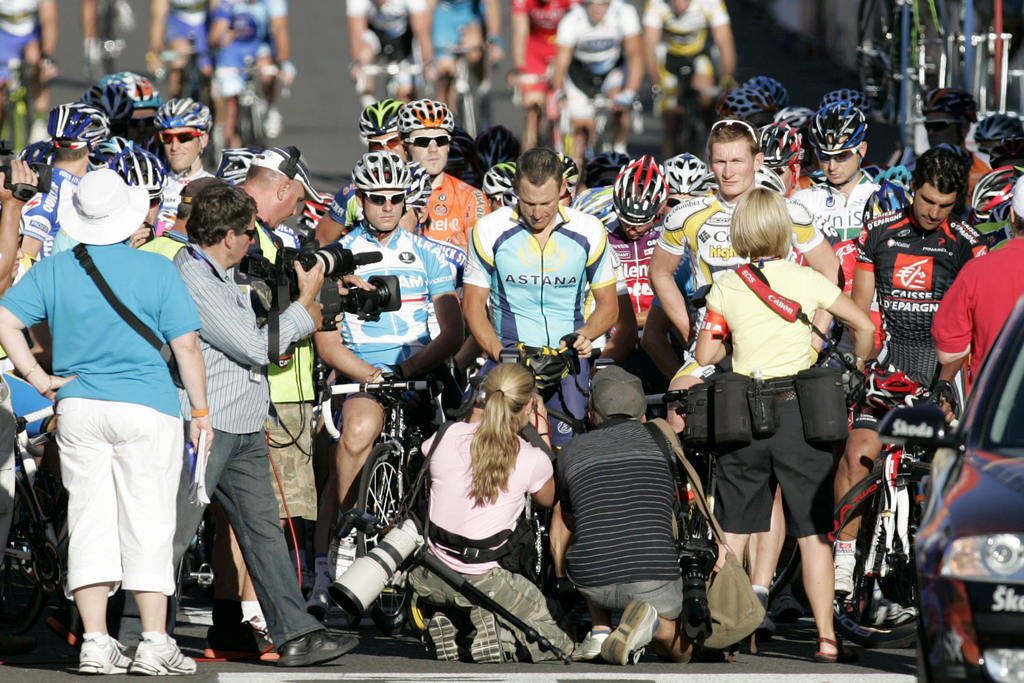Lance Armstrong attends Federal Court hearing
Former Tour de France winner did not speak or testify




On Wednesday, a silent Lance Armstrong attended a key hearing of the federal lawsuit that could see him lose US$100 million with almost one third of the damages potentially going the whistleblower, former US Postal teammate Floyd Landis. During the hearing, US District Judge Christopher Cooper heard arguments from attorneys on both sides of the lawsuit.
Lance Armstrong: If there was an equivalent to EPO, everyone would be on it
Landis: Lance Armstrong has become the self-appointed hypocrisy police
Federal suit against Lance Armstrong hinges on judge's ruling
Lance Armstrong's competition ban partially lifted
Lance Armstrong denies ever using mechanical doping
Lance Armstrong withdraws from One Zero Conference citing legal advice
The US Justice Department believes that Armstrong has defrauded the government, and should repay it for the final years in which the US Postal Service was the title sponsor of the team, between 2000 and 2004.
"Lance Armstrong created a flood of lies that saturated every invoice that was submitted," Cooper was told by U.S. Justice Department attorney Robert Chandler, according to USA Today. "He lied directly to the Postal Service. He had others lie directly to the Postal Service on his behalf. He made countless public statements on television and to print reporters.... false statements perpetuating his lie that he wasn't doping."
Elliot Peters, Armstrong's attorney, is asking that the case be reduced or thrown out. Currently, no trial date has been set. Asked for comment by USA Today when leaving the courtroom, Armstrong declined.
Landis, whose testimony sparked the long-running case, did not attend the court but was represented by his attorney, Paul Scott. Landis filed the lawsuit in 2010 under the Federal False Claims Act, which allows citizens to sue on behalf of the US government if they believe that it has been defrauded. If the case is successful, the whistleblower can be awarded 30 per cent of any money awarded to the government. The case gained momentum after Armstrong admitted to doping in an interview with Oprah Winfrey in January 2013, following the United States Anti-Doping Agency report into what they dubbed "the most sophisticated, professionalized and successful doping program that sport has ever seen."
In the aftermath of his confession, Armstrong offered the government $5 million in an attempt to reduce the possible fallout. It was rejected and the US Justice Department joined Landis in February 2013, in an effort to recover sponsorship funding paid by the US Postal Service between 1996 and 2004. The federal government has argued that the team violated its sponsorship arrangement by extensive doping and that it was defrauded by Armstrong and the team.
Peters and Armstrong have argued that the Postal Service was not damaged and in fact, benefited by more than its $32.3 million sponsorship. Peters cited documents from the Postal Service, estimating it received more than $160 million in media exposure between 2001 and 2004 according to USA Today, who also reported that Peters showed Cooper a 2012 email which read "USPS got more than it paid for and is not a victim of fraud."
The latest race content, interviews, features, reviews and expert buying guides, direct to your inbox!
"There's no science that would stand for the proposition that negative publicity about an athlete who competed for a sponsored team which occurs eight years after the end of the sponsorship has any impact on the sponsor," Peters reportedly told the judge.
Peters and Armstrong's other attorneys also argued that invoices for payments were submitted by Tailwind Sports, who owned the team and dissolved in 2007.
Chandler argued that the government had sought sponsorship of a clean team and therefore the sponsorship was "essentially worthless". Chandler added although the US Postal Service contract was with Tailwind and not Armstrong, the 45-year-old's lies "saturated" the invoices.
"This was not the brand advertising we were promised," Justice Department attorney David Finkelstein said. "This is not the brand advertising we bargained for. This was media we specifically bargained to avoid. Any loss in value can be the basis for damages… It ought to go to jury."

